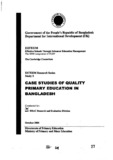Case studies of quality primary education in Bangladesh
Citation
Nath , S. R., Mahbub, A., Shahjamal, M. M., Kabir, M. M., & Zafar, T. (2004, October). Case studies of quality primary education in Bangladesh. Research Reports (2004): Social Studies, Vol – XXXIV, 38–184.Abstract
How do some primary schools in Bangladesh succeed despite of well
documented constrains they face? The major primary education research
programmes conducted in Bangladesh over recent years have consistently
demonstrated that the inputs to primary education are insufficient and often of
poor quality, teaching and learning processes remain limited to a very narrow
range of practice, and achievement levels are disappointingly low. Findings of
the PSPMP study, Education Watch, ESTEEM classroom research and several
official government documents and statistics reflect all the above. So how is it
that certain schools manage to provide a high quality of education in the
circumstances, when the problems exist for all?
The survey-based methods commonly used to study the factors determining
educational opportunity and outcomes have taken us some distance in
understanding success and failure, but the complexity of the school as a living
community demands that further insights be obtained by expanding the horizons
of our research activities. To this end, the present study attempts to draw on
anthropological and ethnographic research traditions to achieve original insights
into what it feels like to live in and be part of a school, which really makes a
difference.
The quality of education has been defined in a broader sense, which includes
strong community participation in school improvement, leadership quality of the
school heads, teachers' active participation in mentoring the learners, healthy
teaching learning atmosphere in the classrooms, putting students in the centre of
educational setting, and learning achievement of the students. It has recognized
that having all these characteristics in one school is too much to want - a school
can be successful in any one or more of the above areas. Six case studies have
prepared on purposively selected six successful primary schools in Bangladesh -
five of these schools are government and one is registered non-government.
These are located in six different districts viz., Bandarban, Chittagong, Dhaka,
Jessore, Nawabganj and Pabna. Selection of the schools was guided by the
Steering Committee fom1ed for the study. The Research and Evaluation Division
of BRAC conducted the study.

